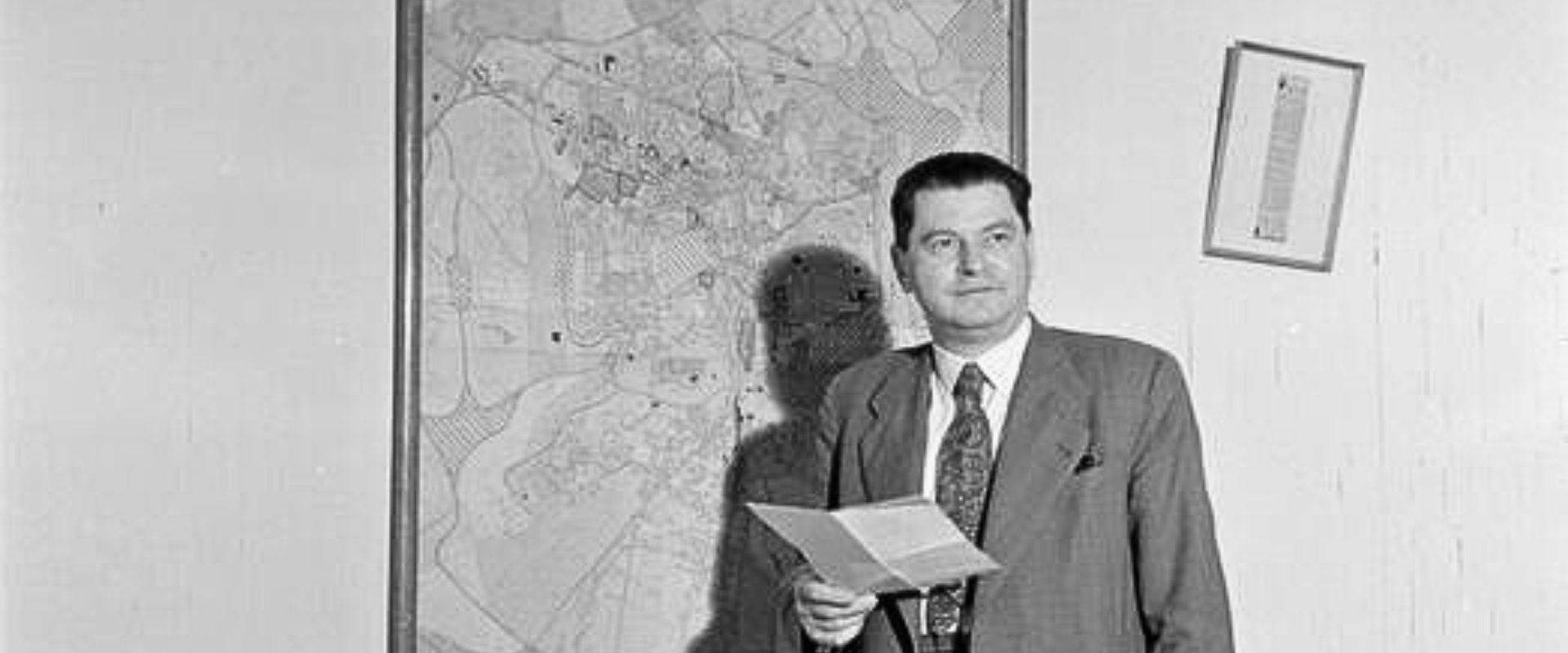
Daniel Auster was born in Galicia in 1893 and earned a law degree from the University of Vienna before making aliyah in the spring of 1914. He arrived just before the outbreak of World War I and was, indeed, soon drafted into the Austrian army, serving as an officer in the Damascus headquarters of Djemal Pasha, the region’s Governor and Military Commander.
After the war, Auster settled in Jerusalem, married Julia Mani, the daughter of the Hebron-born justice Malkiel Mani, and opened a law practice. He was, according to the 1921 local phonebook, one of just seven practicing lawyers in town.
He was civically active – helped found the neighborhood of Rehavia, and served on the city council, as Deputy Mayor and then – amid endless drama and maneuvering between the city’s Jewish, Muslim and Christian politicians – as Acting Mayor. He was officially appointed to the city’s top job by the British High Commissioner in the summer of 1944 after the death of Mustafa al-Khaldi.
He was a member of the Zionim HaKlali’im, the General Zionists, a centrist political party that supported Chaim Weizmann, rather than Ben-Gurion, and that is today considered to be one of the ideological ancestors of the Likud party.
He unsuccessfully ran for the first Knesset on an independent list called ‘For Jerusalem,’ receiving a grand total of 842 votes nationwide. Humiliated, he continued to serve as Mayor of the new state’s capital till 1951.
For the rest of his life – till his death in 1963, at the age of 69 – he worked as a lawyer, and also, somewhat randomly, as Thailand’s honorary Consul General in Israel.
The thirty-seven people who signed Megillat Ha’Atzmaut on May 14, 1948, represented many factions of the Jewish population: there were revisionists and Labor Party apparatchiks; capitalists and communists and socialists; kibbutznikim, moshavnikim and city-folk; charedi rabbis and atheists.
Over the course of the past several months, our team has diligently tracked down the closest living relative of each one of these signatories, and interviewed them. We talked about their ancestors and families, about the promise of the Declaration, the places in which we delivered on that promise, the places in which we exceeded our wildest dreams, and also about the places where we fell short.
And it is through these descendants of the men and women who – with the strike of a pen – gave birth to this country of ours, that we wish to learn something about ourselves.
Today we’ll meet Daniel Auster, and his nephew, Eli Racah. He’ll present one of the many political perspectives we’ll be featuring throughout the series.
In 1961 Eliezer Whartman of the Israel State Archives conducted a series of interviews with 31 of the 37 signatories of the Declaration of Independence. For the full interview with Daniel Auster, see here.
For an overview of Auster’s tenure as Mayor of Jerusalem, see historian Mordechai Naor’s Haaretz article.
For a recent survey of Jerusalem’s municipal elections, including the Auster years, see Yechiam Weitz’ “Municipal Elections in the Holy City: Campaigns, Results, and Coalition Building in Jerusalem, 1948-1973.”
For a Palestinian perspective on the upheaval within the Jerusalem municipality in 1948, see Haneen Naamneh’s 2019 article, “A Municipality Seeking Refuge: Jerusalem Municipality in 1948.”
For a classical novel about Jerusalem in 1948, see Larry Collins and Dominique Lapierre’s O Jerusalem.
For a wonderful history of Jerusalem, which charts 3000 years of – as the author wrote – faith, slaughter, fanaticism and coexistence, see Simon Sebag Montefiore’s Jerusalem: The Biography.
For a podcast episode (and accompanying write-up) about Auster, see tour guide Rafi Kfir’s “Ahavat Yerushalayim” (in Hebrew).
Here is the 29-person list that Auster headed in his failed bid for Israel’s first Knesset in 1949, and here is a collection of photographs of Auster at the National Library (including this one with Chaim Weizmann).
Mitch Ginsburg and Lev Cohen are the senior producers of Signed, Sealed, Delivered? This episode was mixed by Sela Waisblum. Zev Levi scored and sound designed it with music from Blue Dot Sessions. Our music consultants are Tomer Kariv and Yoni Turner, and our dubber is Yoav Yefet. A special thanks to our go-to Brit, Jacob Lazarus.
The end song is Ir HaElohim (lyrics and music – Shaanan Streett, Itai Peled, Omer Mor (Itzik Ptzatzati/Isaac DaBom), Moshe Asraf, Yair (Yaya) Cohen Harounoff, David Ariel (Dudush) Klemes, Shlomi Alon and Guy (Margalit) Mar), performed by Hadag Nahash.
This series is dedicated to the memory of David Harman, who was a true believer in the values of the Declaration of Independence, in Zionism, in democracy and – most of all – in equality.